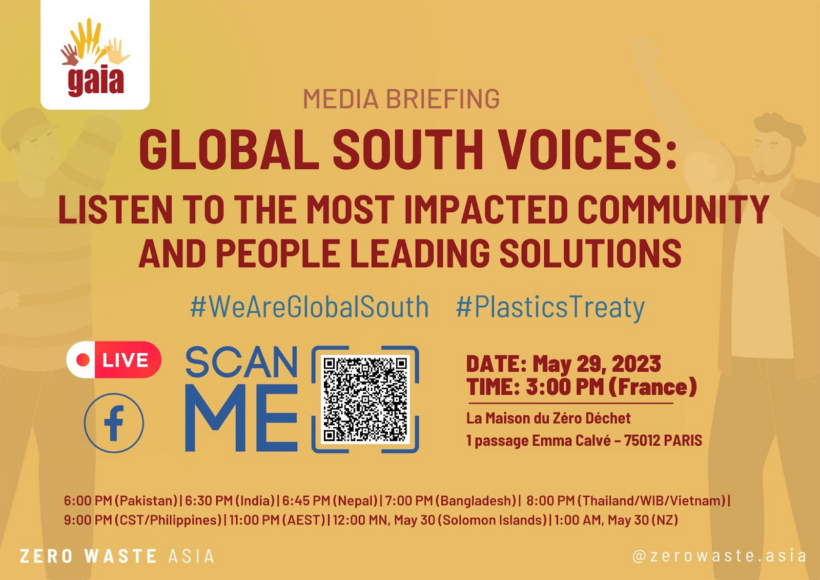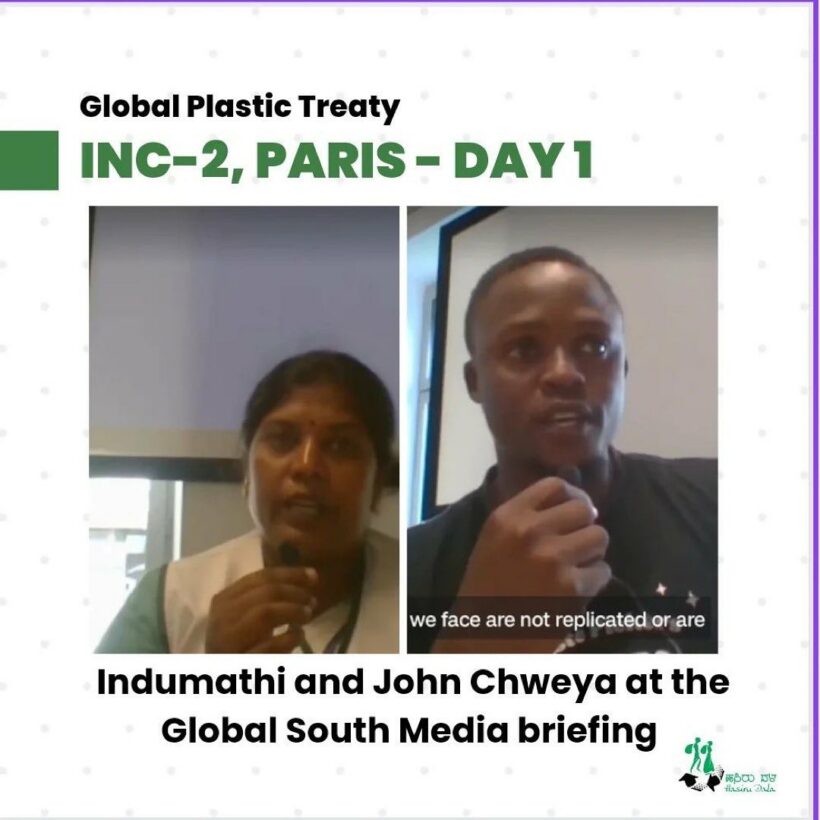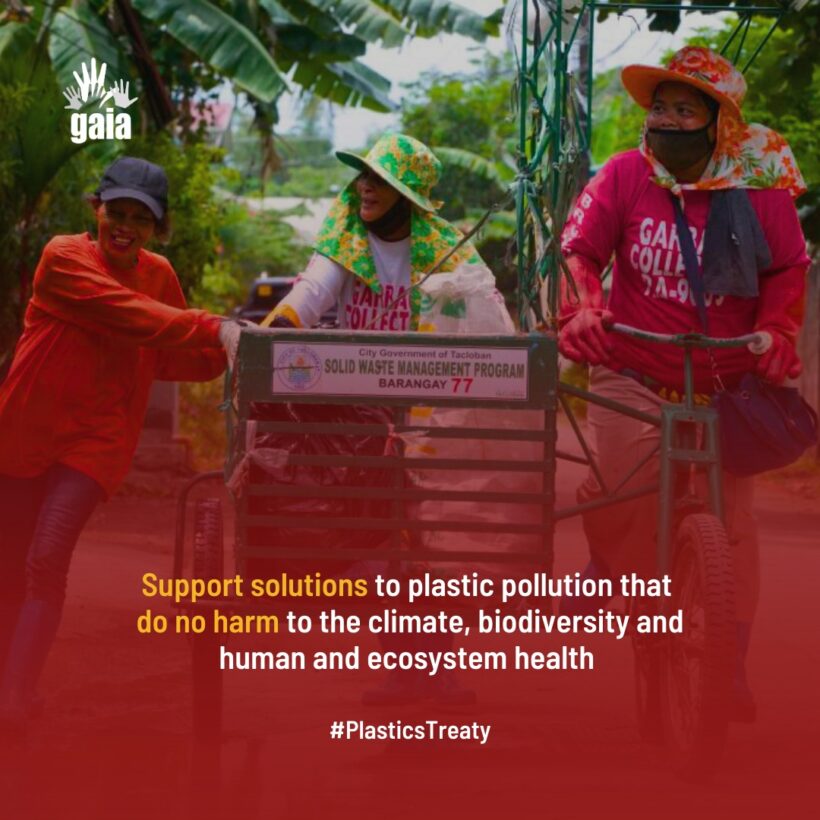Paris, France– The Global Alliance for Incinerator Alternatives (GAIA) held a press conference along with representatives from Acción Ecológica México, Zero Waste Alliance Ecuador, Alliance of Indian Waste Pickers, Kenya National Waste Pickers Welfare Association, and Community Action Against Plastic Waste to provide perspectives from civil society organizations in the global south as the second session of the Intergovernmental Negotiating Committee on Plastic Pollution commenced yesterday.

Expert panelists from Africa, Asia Pacific, Latin America, and the Caribbean demanded the need for member states to negotiate a strong global plastics treaty that addresses the adverse impacts of plastics across its life cycle in the Global South. This includes key issues such as addressing waste colonialism, preventing false solutions and dangerous practices such as open burning, incineration, firing in coal-fired power plants and other waste-to-energy processes, co-processing in cement kilns, and chemical recycling that only exacerbate the harms from the plastic pollution crisis. As well as putting an end to double standards whereby big brands package their products in cheap, unrecyclable single-use plastics, and guarantee a just transition for waste pickers and workers who are the backbone of recycling in the Global South.

“The world has a historical debt towards waste pickers. Across the globe, our communities have been preventing and managing pollution of the environment from waste, and in particular plastic waste. Ending plastic pollution cannot happen without us, and this treaty negotiation process has to center our voices and expertise to achieve a Just transition towards that goal” John Chweya, Kenya National Waste Pickers Welfare Association.
“In any country, waste pickers do not get fair returns for their work. Waste pickers know that there are toxic chemicals in plastic but we still make sure we recover them and save the environment. But nobody identifies us as environmentalists… and now with the changing plastic management system it will be a worse situation; that is the reason we are asking for a just transition, says Indumathi, Alliance of Indian Wastepickers.
Furthermore, the press conference drew attention to the demands of civil society organizations for a strong plastic treaty. The demands entail mandatory targets to cap and dramatically reduce virgin plastic production, commensurate with the scale and gravity of the plastic pollution crisis, and aligned with planetary limits. Bans on toxic chemicals in all virgin and recycled plastics based on groups of chemicals, including additives (e.g., brominated flame-retardants, phthalates, bisphenols) as well as notoriously toxic polymers (e.g. PVC). Legally binding, time-bound, and ambitious targets to implement and scale up reuse and refill to accelerate the transition away from single-use plastics. Correspondingly, the treaty must reject false solutions. A just transition to safer and more sustainable livelihoods for workers and communities across the plastics supply chain, including those in the informal waste sector; and addressing the needs of frontline communities affected by plastic production, incineration, and open burning. Provisions that hold polluting corporations and plastic-producing countries accountable for the profound harms to human rights, human health, ecosystems and economies arising from the production, deployment and disposal of plastics. The treaty should also set publicly accessible, harmonized, legally binding requirements for the transparency of chemicals in plastic materials and products throughout their whole life cycle. And keep polluters out of the treaty process.
Arpita Bhagat, Plastic Policy Officer for the GAIA Asia Pacific region, said: “Restricted and limited access issues disproportionately impact low-income, worse affected frontline and fenceline communities from the Global South who have the highest stake in the ongoing negotiations for an international agreement against plastic pollution. This is a clear violation of UNEP’s own rules for stakeholder participation. Meanwhile, the access and influence of polluters, indicative of corporate capture of the process, are visible throughout, the recent Spotlight report being a good example. Our voices and concerns are unaddressed. We look for the support of the media to amplify our voices and demand justice for the Global South.”
Moreover, the journey for Global South participants to the second session of the Intergovernmental Negotiating Committee on Plastic Pollution has not been an easy one. The civil society organizations said that Global South participants, especially the ones coming from the most vulnerable groups that are highly affected by plastic pollution, are being asked to produce unreasonable requirements for the VISA process. These requirements include an employment contract and proof of sizable income. The organizations argue that even for an applicant fully sponsored by an organization with all the necessary supporting documents it is still a barrier that jeopardizes the whole INC process.
On the other hand, organizations have also faced problems with restrictions on organizing side events, further limiting civil society participation in the treaty negotiations. Alejandra Parra, plastics and zero waste advisor at GAIA Latin America and the Caribbean comments, “All requests for co-organization of INC-2 side events submitted by Latin American organizations were rejected, including those that contemplated the participation and leadership of Indigenous Peoples from the region. This is not only frustrating and unfair, but contradicts the global participation that the treaty itself proposes as a basic principle”.
Notes:
-
Africa: INC2 Expectations from GAIA and BFFP in the African region, representing CSOs from Tanzania, Kenya, Ghana, Nigeria, South Africa, The Gambia, Mauritius, Tunisia, Uganda, Cameroon, Egypt, Ethiopia, and DR Congo. Read our member statement in English, French, Swahili, Portuguese, and Arabic.
-
Asia Pacific: For updates on Asia Pacific engagement at the INC2, visit The Global Plastics Treaty: Asia Pacific Perspectives – GAIA (no-burn.org)










